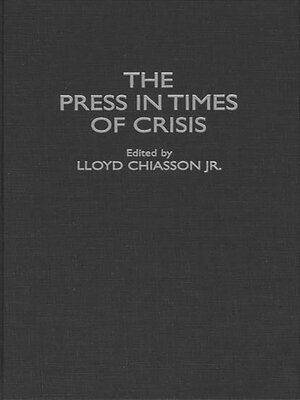The Press in Times of Crisis
ebook ∣ Contributions to the Study of Mass Media and Communications
By Lloyd E. Chiasson

Sign up to save your library
With an OverDrive account, you can save your favorite libraries for at-a-glance information about availability. Find out more about OverDrive accounts.
Find this title in Libby, the library reading app by OverDrive.



Search for a digital library with this title
Title found at these libraries:
| Library Name | Distance |
|---|---|
| Loading... |
Throughout American history, the press has been incredibly adept at making the public aware. The history of the press in crisis situations is in many ways the story of public attitudes and the story of America. This book looks at the press over time and the way it has functioned in times of crisis. It considers press coverage of 13 events, spanning a time frame that includes the birth of the nation, its political, economic, and social struggles as a young country, and its civil war. It tells how a young agrarian society grew into an industrial giant, and how it changed from isolationist to a world power. It relates how this country coped with the growth of socialism, two world wars, civil unrest, and with the problem of world overpopulation.
The American press has performed various functions throughout the years. The Colonial Press served as a vehicle of discussion, debate, and finally agitation and, in the process, may have defined itself and laid a groundwork for the press's future roles. The press has agitated, advocated, and persuaded. It has been duped, it has been unfair, and it has misled. This volume considers such concepts as advocacy journalism, a central theme of the chapters on abolitionists and David Duke, and social responsibility, a primary part of the chapter on Japanese-American internment. The press's attempt to lead public opinion is the focus of the chapters on the partisan press, the antebellum period, and the first Red Scare in 1919. The chapter on Joseph McCarthy looks at the concepts of objectivity and the use and misuse of pseudo news. The final chapter, on overpopulation, deals extensively with agenda setting.
The American press has performed various functions throughout the years. The Colonial Press served as a vehicle of discussion, debate, and finally agitation and, in the process, may have defined itself and laid a groundwork for the press's future roles. The press has agitated, advocated, and persuaded. It has been duped, it has been unfair, and it has misled. This volume considers such concepts as advocacy journalism, a central theme of the chapters on abolitionists and David Duke, and social responsibility, a primary part of the chapter on Japanese-American internment. The press's attempt to lead public opinion is the focus of the chapters on the partisan press, the antebellum period, and the first Red Scare in 1919. The chapter on Joseph McCarthy looks at the concepts of objectivity and the use and misuse of pseudo news. The final chapter, on overpopulation, deals extensively with agenda setting.







